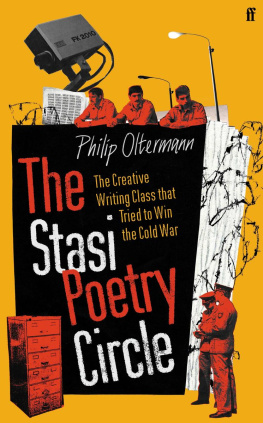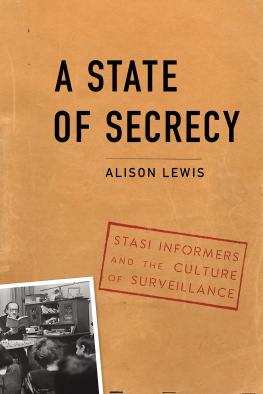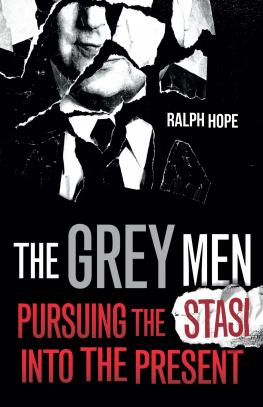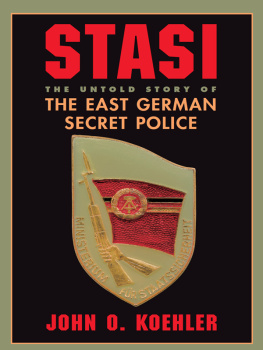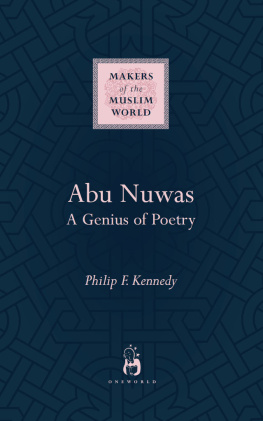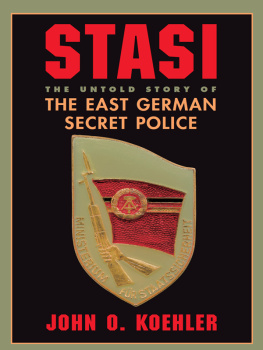Philip Oltermann - The Stasi Poetry Circle
Here you can read online Philip Oltermann - The Stasi Poetry Circle full text of the book (entire story) in english for free. Download pdf and epub, get meaning, cover and reviews about this ebook. year: 2022, genre: Detective and thriller. Description of the work, (preface) as well as reviews are available. Best literature library LitArk.com created for fans of good reading and offers a wide selection of genres:
Romance novel
Science fiction
Adventure
Detective
Science
History
Home and family
Prose
Art
Politics
Computer
Non-fiction
Religion
Business
Children
Humor
Choose a favorite category and find really read worthwhile books. Enjoy immersion in the world of imagination, feel the emotions of the characters or learn something new for yourself, make an fascinating discovery.
- Book:The Stasi Poetry Circle
- Author:
- Genre:
- Year:2022
- Rating:5 / 5
- Favourites:Add to favourites
- Your mark:
- 100
- 1
- 2
- 3
- 4
- 5
The Stasi Poetry Circle: summary, description and annotation
We offer to read an annotation, description, summary or preface (depends on what the author of the book "The Stasi Poetry Circle" wrote himself). If you haven't found the necessary information about the book — write in the comments, we will try to find it.
The Stasi Poetry Circle — read online for free the complete book (whole text) full work
Below is the text of the book, divided by pages. System saving the place of the last page read, allows you to conveniently read the book "The Stasi Poetry Circle" online for free, without having to search again every time where you left off. Put a bookmark, and you can go to the page where you finished reading at any time.
Font size:
Interval:
Bookmark:
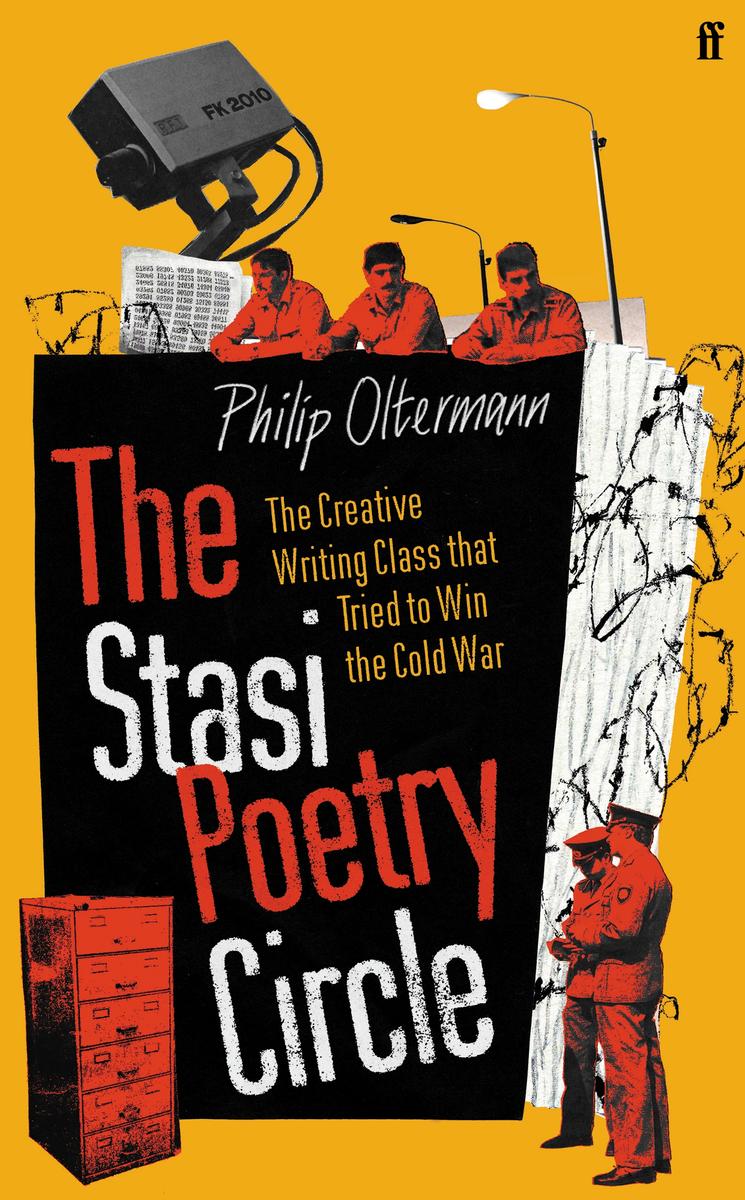

v
For A. & E.
Jrgen Polinske, Stasi Main Division VI: Passport Control, surveillance of tourists
A border guard
Bjrn Vogel, Stasi Records Department Division XII: Central Information Service and Archive
A second lieutenant
Rolf-Dieter Melis, Stasi Paramilitary Section: Guards Regiment
A major
Alexander Ruika, Stasi Paramilitary Section: Guards Regiment
A conscripted soldier
Gerd Knauer, Stasi Propaganda Unit: Working Group Public Liaisons
A junior officer
Uwe Berger, Working Circle of Writing Chekists
A professional poet and leader of the Stasi poetry circle
Annegret Gollin, target of Operation Transit
An unpublished poet and negative-decadent citizen
Gert Neumann, target of Operation Anthologie
A published novelist and member of the literary underground
Although the characters in this book are real, some names have been changed.
An introductory performance, action, or event preceding and preparing for the principal or a more important matter.
As a new chill descended on Europe, Jrgen Polinske was waiting at the gates of the compound, thinking about ice cream. There was a place in Prenzlauer Berg he liked that sold chocolate, vanilla and changing fruit flavours at fifty Pfennig a cone. Hed been to ice cream parlours in Leipzig and Halle where they sold as many as twenty different flavours. Not Italian gelato like they had in the West, but good ice cream still. Creamy. His favourite was the simple, plastic-wrapped Moscow-style ice cream you could buy at every corner store: exquisitely soft vanilla, between two sheets of waffle. Polinske belonged to an elite of connoisseurs who loved eating ice cream even when it was cold outside.
He rang the bell for a second time and checked his watch. He could see that his predicament was not without irony. As a member of the German Democratic Republics Passport Control Unit, it was usually him who enjoyed taking his time to scrutinise the wads of permits and identification papers as the queues built up outside his checkpoint. Today the tables had been turned on him. Here at Adlershof, only the uniformed members of East Germanys paramilitary unit, the Wachregiment with their Bordeaux-red collar patches, were allowed to walk straight through the checkpoint. Plain-clothes members of the Stasis other units had to bide their time after handing over their passports. The guard at the front desk made a call to the control room, who sent down a courier to pick up the ID to take it back upstairs, where someone else checked it against the daily list of accredited names.
But Polinske, a stocky man with restless eyes, was the last person who would lose his cool over such games. What had nine years in the army taught him if not how to stand and wait without losing your temper? For the officers exam he was hoping to take in a few years time, they apparently made you sit, back straight, for two hours, no fidgeting allowed. Well, they could bring it on. Before he was moved to the border checkpoint at Friedrichstrasse, Polinske used to stand guard at munitions points: stupid, mind-numbing work, because you knew nothing would happen. Private citizens werent allowed to own guns anyway, so why would they come thieving bullets? Yet if you were caught reading, listening to the radio, writing or drawing or even just taking a leak, youd be in trouble. All you were allowed to do was scan the vista in front of you: foreground, middle distance and background, from right to left and from front to back. And then start all over again. So the trick was to learn to entertain yourself using only your imagination. In his cadre file, Polinskes superiors sometimes bemoaned his casual manners, his careless approach to working hours. What he needs is self-control, to avoid drifting from a task set to him and getting distracted by trivialities, one report said. A little bit more concentration will surely help him overcome this weakness. Turned out, they had it the wrong way around. Less concentration is what he needed. Polinske had ended up a good border guard because he was a good dreamer. And here he was, standing outside the most heavily guarded military unit in East Berlin, dreaming of ice cream.
The gate buzzed. A crackle on the intercom. Seminar room three, on the first floor.
*
The Adlershof compound was a mythical place in East Germanys imagination: the home of the GDRs elite fighting force, the Guards Regiment, the men who had supervised the building of the Berlin Wall. On maps of Berlin you could buy in the shops, the site was only a blank spot, without a description. If there had been text, it would have read: Wachregiment Feliks Dzerzhinsky, after the man who founded the Soviet Unions secret police and masterminded the mass executions of the Red Terror. According to the treaties drawn up by the four Allied powers, West Berlin was a demilitarised free city, without an army garrison and without conscription for men registered here: the city in which the capitalist and the communist worlds directly rubbed up against one another could not afford to have open explosives lying around in case the friction sent a rogue spark flying. As a result, West Berlin had over the course of thirty years amassed an army only of pacifists, drop-outs and dreamers as West Germans keen to avoid military service moved to the pre-war capital. Within the fortifications of the Adlershof military compound on the Eastern side of the Wall, however, those stipulations did not apply. In order to minimise its inhabitants contact with the outside world, their compound contained all the amenities of a small village: there was a bank, a boot-maker, a bookshop, a radio station, a cinema, even a swimming pool with a diving facility. And even if these days their day-to-day duties were relatively mundane protecting government apparatchiks at official functions, guarding state buildings, motorcading state visitors from Schnefeld airport into central Berlin, or even just making up the numbers in the stands at home matches of Dynamo Berlin, the Stasis own football team they knew what they had to do in an emergency. The 11,000-strong special fighting force trained beyond the gates of Adlershof did not only have in-depth and applicable political ideological knowledge of MarxistLeninist theory, according to an internal training manual. Each man could run and swim long distances, fight with or without a weapon to defend himself against enemy assaults, stun, kill, tie up, search and cart off the enemy. They could move undetected through enemy territory, using disguises and a network of safe houses. They could operate cameras to record enemy movements and send messages to their superiors via codified or encrypted communication. They could break a wrist with a flick of their elbow, blind an attacker with a torch and split a skull with a spade. Even within the East German military, gun control was tight; only a handful of officers had keys to the compounds arsenal. But if the Cold War turned hot, the well-drilled staff at the Wachregiment would know how to arm themselves in their sleep. Resting on wooden pallets in the long cellar rooms underneath the barrack buildings were crates full of hand grenades, bullets for the KK-MPi-69 East Germanys own small-calibre Kalashnikov machine guns and rocket-propelled grenades for anti-tank weapons. On sturdy shelves squatted twelve heavy Goryunov machine guns that could be mounted on armoured vehicles, as well as lighter Degtyarov guns, nicknamed record players after their disc-shaped pan magazines. Specially made transport containers held semi-automatic carbines and officers sabres; Makarov and Stechkin pistols were stored in a row of metal cabinets. The
Font size:
Interval:
Bookmark:
Similar books «The Stasi Poetry Circle»
Look at similar books to The Stasi Poetry Circle. We have selected literature similar in name and meaning in the hope of providing readers with more options to find new, interesting, not yet read works.
Discussion, reviews of the book The Stasi Poetry Circle and just readers' own opinions. Leave your comments, write what you think about the work, its meaning or the main characters. Specify what exactly you liked and what you didn't like, and why you think so.

